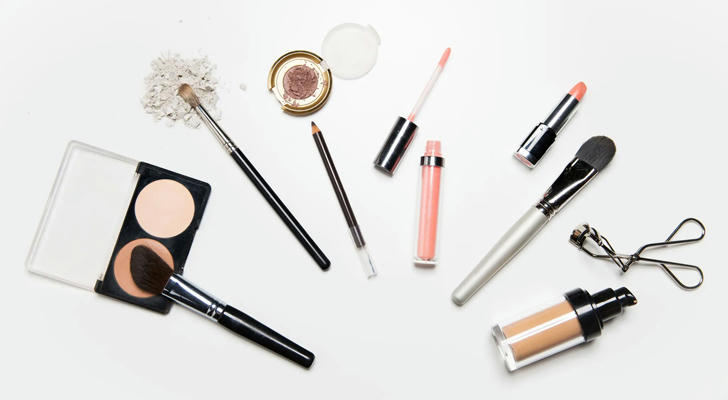The Hidden Dangers in Your Makeup Bag: What Every American Needs to Know
As you swipe that glossy lipstick or smooth on scented lotion, you’re participating in a $104.7 billion U.S. beauty industry—but at what cost? Beneath the Instagram-perfect packaging lie toxins linked to hormone disruption, allergies, and environmental damage. It’s a harsh reality within an industry that often prioritizes profit over safety. Let’s expose the truth behind the cosmetics you may be unknowingly applying to your skin every day and understand the risks associated with these products.

🔍 The Exploding Beauty Industry’s Toxic Secret
The U.S. personal care market is projected to hit $104.74 billion this year (Statista), fueled by an endless stream of new serums, foundations, and fragrances that promise to enhance beauty. Yet, a recent report from McKinsey reveals a dark irony: while consumers increasingly demand "clean" products, 80% of brands still use undisclosed synthetic chemicals within their formulations. This paradox speaks volumes about the transparency issues plaguing the industry.
Why you should worry:
- 📉 FDA loopholes allow over 1,300 untested chemicals in cosmetics, which poses significant risks to consumer health.
- 💸 Americans spend an average of $3,756/year on beauty products (Cropink), yet a staggering 68% struggle to decode complex ingredient labels. This lack of understanding can lead to unintentional exposure to harmful substances.
- 🌎 Additionally, non-biodegradable microplastics from beauty products are contaminating 75% of U.S. waterways, contributing to the broader environmental crisis and harming aquatic life.
⚠️ Health Hazards Hiding in Plain Sight
Hormone Havoc
Parabens and phthalates—common preservatives in drugstore moisturizers—mimic estrogen, triggering early puberty and a variety of reproductive issues in both men and women. The real impact is stark: a UCLA study linked these chemicals to a 20% higher breast cancer risk in long-term users, underpinning the urgency for awareness and reform in cosmetic formulations.
Skin Saboteurs
Fragrances and formaldehyde, often found in products like keratin treatments, can cause:
✅ Allergic reactions in a significant 45% of adults, leading to skin irritation and distress.
✅ Chronic eczema cases have notably spiked in cities like Phoenix, where dry climates intensify the damage caused by these irritants, leaving many suffering without adequate solutions.
The "Greenwashed" Illusion
While terms like "natural" or "botanical" sound appealing, they are largely unregulated in the cosmetic industry. The shocking fact emerges that only 12% of "eco-friendly" brands pass third-party toxicity screenings (Cropink), making it increasingly crucial for consumers to navigate these claims critically and to seek genuine alternatives.
🌿 Clean Beauty Revolution: Cut Through the Noise
Gen Z and Millennials are driving a remarkable 10% annual growth in organic products (Cropink). However, real clean beauty transcends trendy labels—it's about commitment and transparency.
✅ Transparency: Brands such as Credo Beauty set a high standard by listing every ingredient and the sourcing location of their materials, fostering trust in consumers.
✅ Certifications: To ensure safety and ethical practices, look for certifications like EWG VERIFIED™ or Leaping Bunny logos, which signify adherence to stringent safety and cruelty-free standards.
✅ Packaging: Approximately 30% of brands now use recyclable materials—favoring options like glass or aluminum can significantly reduce plastic waste in our environment.
Pro tip: There are useful apps, such as Think Dirty®, that scan the reality can be a mixed bag:
| AI Promise | Reality Check |
|---|---|
| "Skin diagnostics" | Misreads darker skin tones 35% more often, leading to misinformed product recommendations. |
| "Custom formulations" | Oftentimes omit allergy triggers, resulting in harmful advice for sensitive individuals. |
| "Virtual try-ons" | Use filters that mask product flaws, creating unrealistic expectations and potential disappointment upon purchase. |
Case study: A popular AI skincare app falsely recommended retinol to a pregnant user, highlighting a dangerous oversight that could have severely impacted health. Such incidents underline the importance of human oversight and the need for rigorous testing in AI algorithms.
🛡️ Your 5-Step Detox Strategy
Step 1: Audit Your Products
Check labels diligently for these "Toxic Trio" ingredients:
❌ Parabens (e.g., methylparaben)
❌ Sulfates (like SLS/SLES)
❌ Synthetic fragrances that may contain undisclosed harmful chemicals.
Step 2: Embrace Minimalism
Consider reducing your routine to just 5 multi-tasking products. Example: A tinted sunscreen can effectively replace both foundation and a traditional SPF, thus simplifying the selection while also enhancing skin health.
Step 3: Demand Proof
Take an active stance by asking brands for:
- Comprehensive third-party lab reports validating their safety claims.
- Sustainable sourcing certificates to ensure ethical practices in product formulation.
- Transparency regarding carbon-neutral shipping options that minimize environmental impact.
Step 4: Tech Wisely
Use AR try-ons only for shade matching purposes—never for assessing ingredient safety. Understanding the limitations of these technologies can help safeguard your health while shopping.
Step 5: Amplify Your Voice
Join campaigns such as #ToxicFreeBeauty to apply pressure on regulators for change. Result: This grassroots activism has led to significant outcomes, including California’s 2024 ban on 24 toxic chemicals used in cosmetics, paving the way for a safer beauty landscape.
💥 The Clock is Ticking
Every 8 seconds, an American develops a cosmetic-related skin allergy, alerting us to the urgent need for reform and awareness in our beauty product choices. With the beauty industry expanding at an annual rate of 5% (McKinsey), your choices today will shape tomorrow’s standards for safety and accountability.
Dare to demand better. Start by swapping out just one toxic product this week—your body and the planet will undoubtedly thank you for it.
"When 85% of consumers prioritize sustainability (Cropink), we collectively hold the power to drive transformative change in the beauty industry. Start small, but more importantly, start now."
https://www.mckinsey.com/industries/consumer-packaged-goods/our-insights/state-of-beauty
https://cropink.com/beauty-industry-statistics
https://www.statista.com/outlook/cmo/beauty-personal-care/united-states
